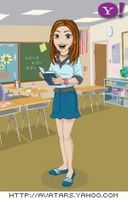The Perks of Being a Wallflower by Stephen Chbosky
 This is another book that was recommended to me by my students. This book is so captivating that I read it in one day while waiting for delayed flights from Chicago. The book opens with a teenager named Charlie who is dealing with the suicidal death of a close friend. We go on to read that Charlie has experienced another death in his lifetime when he was seven years old; that death traumatized him so much that he was placed into a psychiatric hospital. As we continue reading, we find out about how there is something a little off about Charlie and it seems that he is a little unstable. The book allows us to experience high school through Charlie's perspective; the loneliness, the stereotypes, new friendships, broken hearts. We also learn about Charlie's unstable mind and the cause of his emotional issues.
This is another book that was recommended to me by my students. This book is so captivating that I read it in one day while waiting for delayed flights from Chicago. The book opens with a teenager named Charlie who is dealing with the suicidal death of a close friend. We go on to read that Charlie has experienced another death in his lifetime when he was seven years old; that death traumatized him so much that he was placed into a psychiatric hospital. As we continue reading, we find out about how there is something a little off about Charlie and it seems that he is a little unstable. The book allows us to experience high school through Charlie's perspective; the loneliness, the stereotypes, new friendships, broken hearts. We also learn about Charlie's unstable mind and the cause of his emotional issues.I can see why my students recommended this to me and plan to recommend it to future students. If you like emotional stories, or stories about teenage "issues," you'll enjoy The Perks of Being A Wallflower.
A trite coming-of-age novel that could easily appeal to a YA readership, filmmaker Chbosky's debut broadcasts its intentions with the publisher's announcement that ads will run on MTV. Charlie, the wallflower of the title, goes through a veritable bath of bathos in his 10th grade year, 1991. The novel is formatted as a series of letters to an unnamed "friend," the first of which reveals the suicide of Charlie's pal Michael. Charlie's response--valid enough--is to cry. The crying soon gets out of hand, though--in subsequent letters, his father, his aunt, his sister and his sister's boyfriend all become lachrymose. Charlie has the usual dire adolescent problems--sex, drugs, the thuggish football team--and they perplex him in the usual teen TV ways. [...] Into these standard teenage issues Chbosky infuses a droning insistence on Charlie's supersensitive disposition. Charlie's English teacher and others have a disconcerting tendency to rhapsodize over Charlie's giftedness, which seems to consist of Charlie's unquestioning assimilation of the teacher's taste in books. In the end we learn the root of Charlie's psychological problems, and we confront, with him, the coming rigors of 11th grade, ever hopeful that he'll find a suitable girlfriend and increase his vocabulary. --Publishers Weekly
Read some for yourself: http://www.amazon.com/Perks-Being-Wallflower-Stephen-Chbosky/dp/0671027344/sr=8-1/qid=1167673861/ref=pd_bbs_sr_1/105-4307603-4662060?ie=UTF8&s=books



 I have been wanting to read The Joy Luck Club for a few years, and I was finally able to. It is the story of four Chinese women who come to America to escape their war-torn country and thier American-born daughter who struggle with thier families' heritage and assimilation into American culture.
I have been wanting to read The Joy Luck Club for a few years, and I was finally able to. It is the story of four Chinese women who come to America to escape their war-torn country and thier American-born daughter who struggle with thier families' heritage and assimilation into American culture.




 This is the second book I read over the holidays, and I would've written about it sooner, but life got in the way. I read this after a friend highly recommended it to me. You may have heard about it in the news lately because there is some controversy over the validity of some of the information within.
This is the second book I read over the holidays, and I would've written about it sooner, but life got in the way. I read this after a friend highly recommended it to me. You may have heard about it in the news lately because there is some controversy over the validity of some of the information within. I literally just finished reading The Wedding ten minutes ago. All I can say is that I put the book down with a tear in my eye, a smile on my face, and a warm fuzzy feeling in my heart. The Wedding is the sequel to the book The Notebook. I have not read The Notebook, but saw the movie last year and loved it. It is an easy read, written from the point of view of Wilson, the son-in-law of Noah Calhoun (the main character from The Notebook), and even though I have not read the first book, I was able to follow along just fine.
I literally just finished reading The Wedding ten minutes ago. All I can say is that I put the book down with a tear in my eye, a smile on my face, and a warm fuzzy feeling in my heart. The Wedding is the sequel to the book The Notebook. I have not read The Notebook, but saw the movie last year and loved it. It is an easy read, written from the point of view of Wilson, the son-in-law of Noah Calhoun (the main character from The Notebook), and even though I have not read the first book, I was able to follow along just fine.